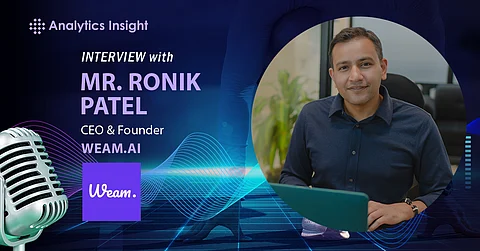

Autonomous AI agents took center stage in 2025, with major players vying to lead the next phase of innovation. Tech giants like Salesforce released AgentForce, and Microsoft launched its own Copilot Agents.
However, the key question remains: Will this momentum continue? Some believe it's hype! Others see it as a meaningful leap. Either way, agentic AI is expected to shape enterprise tech in the year ahead.
In this episode of the Analytics Insight Podcast, host Priya Dialani talks to Ronik Patel, founder and CEO of Weam.AI, as he shares insights about the rise of autonomous AI agents and how businesses can prepare for them.
Generative AI tools like ChatGPT changed how we access information and answer questions. However, they fall short when it comes to handling complex workflows or multi-step tasks. Autonomous AI agents take things further. They connect multiple actions and chain tasks to meet broader goals. This makes them a potential game-changer across many industries.
Ronik Patel founded Weam.AI to help IT companies adopt AI effectively. He previously ran a traditional IT business that developed websites, e-commerce platforms, and custom software. After exiting that company, he saw firsthand how confusing AI adoption could be for business leaders.
“There was a lot of hype and confusion,” Ronik said. He further explains, “Leaders weren’t sure how to bring AI into their teams.” His goal with Weam.AI was to reduce that friction and guide IT businesses through AI adoption.
Even though generative AI exploded in popularity like ChatGPT reaching 100 million users in one week, Ronik noticed a problem. His team of tech-savvy employees didn’t immediately start using AI tools.
Why? “There’s a mindset issue. “People felt AI couldn't replace their work. They were resistant,” he says. That resistance led to internal training sessions and workshops. However, even when people tried tools like ChatGPT, they found limits.
The models didn’t understand their specific business context. They weren’t tailored for internal workflows. That’s when Ronik and his team built a rough version of Weam.AI internally. They used it as a testing ground. The results showed promise. It helped reduce friction and improve adoption.
Weam.AI isn’t building general-purpose tools. The company focuses on helping IT firms integrate AI where it fits naturally. It could be in development, automation, or client support. Ronik emphasizes that each industry faces different AI challenges. “What works in IT may not work in healthcare,” he says. Even within businesses, some roles are more adaptable than others.
Customer support is a clear example. Companies like Zomato and Klarna are already integrating AI to improve how they serve users. These are the areas where agentic AI may find its strongest foothold.
Ronik started in genetics at Rutgers University and spent time at Harvard. But his career soon shifted toward IT. Over a decade, he led a software company that served various business needs.
When generative AI arrived, he realized how disruptive it would be. “I wanted my team of over 100 people to use ChatGPT. But they didn’t. Even with tech skills, they lacked the mindset or the know-how to integrate it into daily tasks,” he recalls. This experience led him to see the potential of agent. AI tools that could be shared across the company and help users with everything from prompting to automating workflows.
So, where are we seeing autonomous agents gaining traction?
Ronik believes marketing is leading the way. Companies like Meta are already exploring agents to build full ad campaigns, from copy and imagery to audience targeting. “There’s an entire industry of ad agencies that may get disrupted,” Ronik notes. “Platforms like Facebook could automate this entire process.”
Marketing isn’t the only area. SEO, content creation, customer engagement, and analytics are all showing early wins for generative AI. While other industries move more slowly, early adopters are already experimenting and learning.
While it’s still early, the companies exploring AI agents now will likely outpace those that wait. Ronik believes that agentic AI can drive measurable business value, especially when integrated into platforms that teams already use. This isn’t just about automation. It’s about augmenting human work with smarter, more context-aware AI systems.
He stresses that AI success isn’t one-size-fits-all. Industry, team culture, and data readiness all play a role. But if used right, autonomous AI agents could be as impactful as cloud computing or mobile tech once were.
Ronik remains optimistic. While some skepticism is healthy, autonomous AI agents are not a fleeting trend. They are shaping a future where digital systems can learn, adapt, and execute with minimal human input.
“The question is no longer if your company will use AI agents. It’s when and how prepared you’ll be when it happens,”says Ronik.
Listen to the full episode on the Analytics Insight Podcast to explore the promise, challenges, and roadmap for integrating autonomous AI agents into your business.
